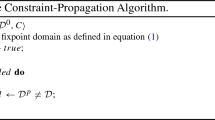Abstract
Current trends in software development enforce the reuse of components allowing us to reduce cost, development times, complexity and, at the same time, increasing the product quality. This is especially true for the KBS, where the cost, times and complexity usually make this technology too risky. PSMs provides us with a way to simplify the development process of KBS with structures and methods that have been previously tested on similar systems. This paper describe our experience on reusing PSM over four different domains.
Preview
Unable to display preview. Download preview PDF.
Similar content being viewed by others
References
Angele, J., Fensel, D., Studer, R.: Domain and Task Modelling in MIKE. In: Suthliffe, A., et al. (eds.) Domain Knowledge for interactive system design., Chapman & Hall, Boca Raton (1996)
Baptiste, P., Le Pape, C., Nuijten, W.: Constraint-Based Scheduling. Applying constraint programming to scheduling problems. Kluwer Academic Publishers, Dordrecht (2001)
Benjamins, R., Fensel, D., Chandrasekaran, B.: PSMs do IT! International Journal of Human-Computer Studies 47(4) (1997)
Benjamins, R.: Problem-Solving Methods for Diagnosis and their Role in Knowledge Acquisition. International Journal of Expert Systems: Research & Applications 8(2), 93–120 (1995)
Breuker, J., Van de Velde, W.: CommonKADS Library for Expertise Modelling. IOS Press, Amsterdam (1994)
Beys, P., Benjamins, V.R., van Heijst, G.: Remedying the Reusability – Usability Trade-off for Problem-Solving Methods. In: Proceedings of KAW 1996, Banff, pp. 2.1-2.20 (1996)
Chandrasekaran, B., Josephson, J., Benjamins, R.: Ontologies: What are they? Why do we need them? IEEE Intelligent Systems and Their Applications 14(1), 20–26 (1999); Special issue on Ontologies
Chandrasekaran, B.: Generic Tasks in Knowledge-based reasoning: High level building blocks for system design. IEEE expert 1(3), 23–30 (1986)
Domingue, J., Motta, E., Watt, S.: The emerging VITAL workbench. In: Aussenac, N., et al. (eds.) EKAW 1993. LNCS(LNAI), vol. 723. Springer, Heidelberg (1993)
Gómez-Pérez, A., Benjamins, R.: Overview of knowledge sharing and reuse components: Ontologies and Problem-Solving Methods. In: Proceedings of the IJCAI 1999 workshop on Ontologies and Problem-Solving Methods (KRR5), Stockholm, Sweden (1999)
Motta, E., Rajpathak, D., Zdrahal, Z., Roy, R.: The Epistemology of Scheduling Problems. In: van Harmelen, F. (ed.) Proceedings of the 15th European Conference on Artificial Intelligence. IOS Press, Amsterdam (2002)
Schreiber, Akkermans, Anjewierden, de Hoog, Shadbolt, Van de Velde, Wielinga: Knowledge Engineering and Management. The CommonKADS Methodology. The MIT Press, Cambridge (1999)
Author information
Authors and Affiliations
Editor information
Editors and Affiliations
Rights and permissions
Copyright information
© 2003 Springer-Verlag Berlin Heidelberg
About this paper
Cite this paper
Rodríguez, A., Palma, J., Quintana, F. (2003). Experiences in Reusing Problem Solving Methods – An Application in Constraint Programming. In: Palade, V., Howlett, R.J., Jain, L. (eds) Knowledge-Based Intelligent Information and Engineering Systems. KES 2003. Lecture Notes in Computer Science(), vol 2774. Springer, Berlin, Heidelberg. https://doi.org/10.1007/978-3-540-45226-3_176
Download citation
DOI: https://doi.org/10.1007/978-3-540-45226-3_176
Publisher Name: Springer, Berlin, Heidelberg
Print ISBN: 978-3-540-40804-8
Online ISBN: 978-3-540-45226-3
eBook Packages: Springer Book Archive




